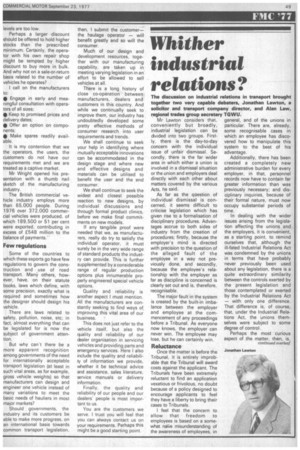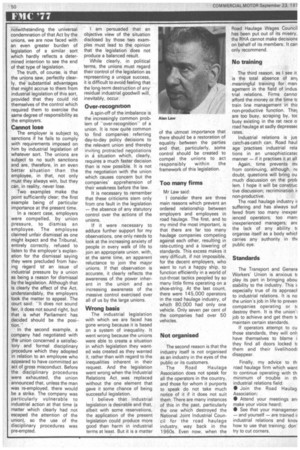Whither industrial relations?
Page 55

Page 56

If you've noticed an error in this article please click here to report it so we can fix it.
The discussion on industrial relations in transport brought together two very capable debaters, Jonathan Lawton, a solicitor and transport company director, and Alan Law, regional trades group secretary TGWU.
Mr Lawton considers that, conveniently but broadly, industrial legislation can be divided into two groups. Firstly, there is the day-to-day concern with the individual issue of unfair dismissal. Secondly, there is the far wider area in which either a union is involved in a dismissal situation or the union and employers deal directly with each other about matters covered by the various Acts, he said.
As far as the q6estion of individual dismissal is concerned, it seems difficult to criticise legislation which has given rise to a formalisation of disciplinary procedures. Advantages accrue to both sides of industry from the creation of procedures; firstly, because the employer's mind is directed with precision to the question of the alleged fault of the employee in a way not previously done, and secondly, because the employee's relationship with the employer as far as discipline is concerned is clearly set out and is, therefore, recognisable.
The major fault in the system is created by the built-in imbalance between the employer and employee at the commencement of any proceedings before a Tribunal. As everyone now knows, the employer can never win. The employee may lose, but he can certainly win.
Reluctance
Once the matter is before the Tribunal, it is entirely improbable that the Tribunal will award costs against the applicant. The Tribunals have been extremely reluctant to find an application vexatious or frivolous, no doubt because of a policy designed to encourage applicants to feel they have a liberty to bring their cases to Tribunals.
I feel that the concern to allow that freedom to employees is based on a somewhat naic/e misunderstanding of the awareness of employees, in general, and of the unions in particular. There are, already, some recognisable cases in which an employee has discovered how to manipulate this system to the best of his advantage.
Additionally, there has been created a completely new administrative burden for every employer, in that, personnel records now have to contain far greater information than was previously necessary; and disciplinary inquiries, because of their formal nature, must now occupy substantial periods of time.
In dealing with the wider issues arising from the legislation affecting the unions and the employers, it is convenient, as a starting point, to remind ourselves that, although the ill-fated Industrial Relations Act was condemned by the unions in terms that have probably never previously been used about any legislation, there is a quite extraordinary similarity between the controls exerted by the present legislation and those contemplated or exerted by the Industrial Relations Act — with only one difference. That difference is, of course„ that, under the Industrial Relations Act, the unions themselves were subject to some degree of control.
Perhaps the most curious aspect of the matter, then, is, notwithstanding the universal condemnation of that Act by the unions, we are now faced with an even greater burden of legislation of a similar sort which hardly reflects a determined intention to see the end of that type of legislation.
The truth, of course, is that the unions saw, perfectly clearly, the substantial advantages that might accrue to them from industrial legislation of this sort, provided that they could rid themselves of the control which required them to exercise the same degree of responsibility as the employers.
• Cannot lose
The employer is subject to sanctions if he fails to comply with requirements imposed on him by industrial legislation of whatever sort. The unions are subject to no such sanctions and are, therefore, in an even better situation than the employee, in that, not only must they always win, but they can, in reality, never lose.
Two examples make the point sufficiently clear; the first example being of particular importance at the present time.
In a recent case, employers were compelled, by union pressure, to dismiss an employee. The employee claimed unfair dismissal as one might expect and the Tribunal, entirely correctly, refused to listen to the employer's explanation for the dismissal saying they were precluded from having regard tcr an issue of industrial pressure by a union as being a reason for dismissal by the legislation. Although that is clearly the effect of the Act, understandably, the employers took the matter to appeal. The court said: "It does not sound fair, it does not sound right, but that is what Parliament has decided should be the posi-. tion.
In the second example, a company had negotiated with the union concerned a satisfactory and formal disciplinary procedure which they adopted in relation to an employee who appeared to have committed an act of gross misconduct. Before the disciplinary procedures were exhausted, the union announced that, unless the man was re-employed, there would be a strike. The company was particularly vulnerable to industrial action at that time (a matter which clearly had not escaped the attention of the union), so the use of the disciplinary procedures was pre-empted . I am persuaded that an objective view of the situation disclosed by those two examples must lead to the opinion that the legislation does not produce a balanced result.
While clearly, in political terms, the unions must regard their control of the legislation as representing a unique success, it is difficult to avoid feeling that the long-term destruction of any residual industrial goodwill will, inevitably, occur.
Over-recognition
A spin-off of the imbalance is the increasingly common problem of "over-recognition" of a union. it is now quite common to find companies referring day-to-day policy decisions to the relevant union and thereby inviting protracted negotiations in a situation which, clearly, requires a much faster decision than is now possible. It is not the negotiation with the union which causes concern but the companies' apprehension of their weakness before the law.
It is necessary to remember that these criticisms stem only from one fault in the legislation — the absence of any statutory control over the actions of the unions.
If it were necessary to adduce further support for my observations, one only needs to look at the increasing anxiety of people in every walk of life to join an appropriate union, with, at the same time, an apparent reluctance to join the major unions. If that observation is accurate, it clearly reflects the awareness of the power inherent in the union and an increasing awareness of the massive control exercised over all of us by the large unions.
Wrong basis
The industrial legislation with which we are faced has gone wrong because it is based on a system of inequality. It went wrong because the unions were able to create a situation in which legislation they wanted was created as they wanted it, rather than with regard to the inequalities inherent in their request. And the legislation went wrong when the Industrial Relations Act was replaced without the one element that gave it some chance of being successful legislation.
I believe that industrial legislation is desirable and that, albeit with some reservations, the application of the present legislation could produce more good than harm in industrial terms at least. But it is a matter of the utmost importance that there should be a restoration of equality beneveen the parties and that, particularly, some control should be created to compel the unions to act responsibly within the framework of this legislation.
Too many firms
Mr Law said: I consider there are three main reasons which prevent an ordered relationship between employers and employees in road haulage. The first, and to my mind the most important, is that there are far too many haulage companies competing against each other, resulting in rate-cutting and a lowering of standards. This excess makes it very difficult, if not impossible, for the decent employers, who want to run a happy ship, to function efficiently in a world of cut-throat tactics peopled by so many little firms operating on a shoe-string. At the last count, there were 145,000 operators In the road haulage industry, of which 80,000 had only one vehicle. Only seven per cent of the companies had over 50 vehicles.
Not organised
The second reason is that the industry itself is not organised as an industry in the eyes of the public or its customers.
The Road Haulage Association does not speak for all the operators in the country, anti those for whom it purports to speak do not take much notice of it if it does not suit them. There are many instances of this in the past, particularly the one which destroyed the National Joint Industrial Council for the road haulage industry, way back in the 1960s. Even now, when the Road Haulage Wages Council has been put out of its misery, the RHA cannot make decisions on behalf of its members. It can only recommend.
No training
The third reason, as I see it. is the total absence of any meaningful training for man. agement in the field of inclus. trial relations. Firms canna afford the money or the time tc train line management in thi:; non-productive function. The are too busy, scraping by, toc busy existing in the rat race a road haulage at sadly depressec rates.
Industrial relations is jus catch-as-catch .can. Road haul age practises industrial rola tions in an unsophisticatec manner — if it practises it at all
Again, time prevents mc from continuing, although, ric doubt, questions will bring ou much discussion on the prob lem. I hope it will be construe tive discussion; recrimination non-productive.
The road haulage industry suffering and has always suf fered from too many inexper ienced operators; too mem, inexperienced managers; anc the lack of any ability t( organise itself as a body which carries any authority in th( public eye.
Standards
The Transport and Genera Workers' Union is anxious t( play its part in bringing abou stability to the industry. This especially true of its approach to industrial relations. It is no the union's job in life to proven companies operating or t( destroy them. It is the union"; job to achieve and get them t( maintain certain standards.
If operators attempt to cu those standards, they will onh have themselves to blame t they find all doors locked t( them and their livelihood! disappear.
Finally, my advice to th road haulage firm which want to continue operating with th minimum of trouble in th industrial relations field: • Join the Road Haulag Association; • Attend your meetings an make your Voice heard;
• See that your managemen — and yourself — are trained ii industrial relations and knov how to use that training; don' try to cut corners.
































































































































